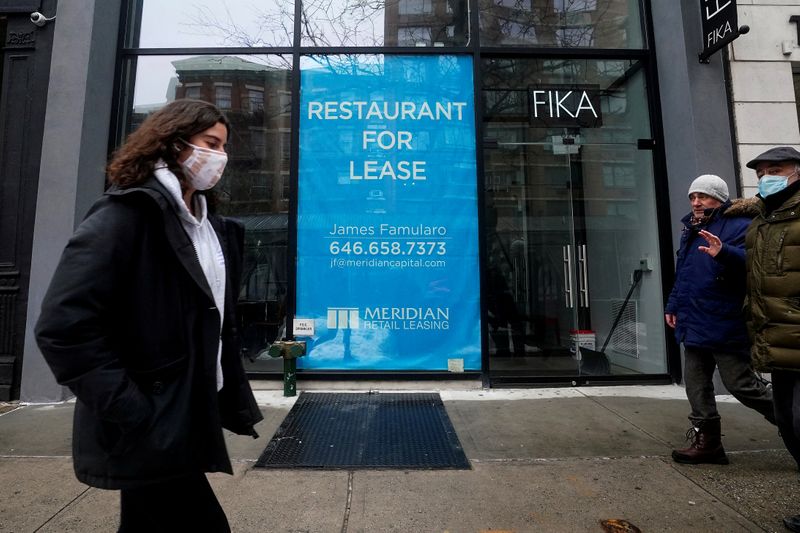By Alwyn Scott
NEW YORK (Reuters) - U.S. insurers are strengthening language in policies that cover business losses to protect them from future claims related to the coronavirus pandemic or other widespread illnesses that disrupt operations, industry sources say.
New policies and renewals now define terms like "communicable disease" or "microorganism" – something existing policies often lacked, and which led to a flood of lawsuits that insurers have so far largely won.
An exclusion drafted by the Lloyd's Market Association, for example, says insurers will not cover any claim "directly or indirectly arising out of, attributable to, or occurring concurrently or in any sequence with a Communicable Disease."
Another, used by Farmers Mutual Hail Insurance Company of Iowa, excludes losses from even the "fear or threat" whether "actual or perceived" of a communicable disease or "any action in controlling, preventing, suppressing" it.
Some companies, such as The Cincinnati Insurance Cos, a unit of Cincinnati Financial Corp (NASDAQ:CINF), said they are not adding exclusions because current policy language makes clear that pandemics are not covered.
"A COVID-19 or pandemic-related exclusion would be like adding suspenders to a belt," spokeswoman Betsy Ertel told Reuters.
Cincinnati has been named in 149 lawsuits for claims denial, ranking it second behind Hartford Financial Services Group (NYSE:HIG) Inc, with 222 suits, and well ahead of Chubb (NYSE:CB) Ltd's 64 and American International Group Inc (NYSE:AIG), with 38, according to data compiled by the University of Pennsylvania Law School.
Plaintiffs attorneys are pressing for coverage to apply. If insurers had been required to cover losses from business customers affected by the pandemic, it would cost them as much as $431 billion a month, according to an industry group. Critics have called that figure inflated.
Litigation related to existing policies sent shockwaves through the industry because of potential losses. The new language aims to snuff out ambiguity.
"Rather than have those terms continue to be undefined, insurers are including definitions to expressly reference COVID-19 or other SARS-related viruses," said Alan Lyons, who chairs the insurance and reinsurance group at law firm Herrick, Feinstein LLP in New York.
Pandemic-hit U.S. businesses have filed nearly 1,500 lawsuits challenging insurers who denied claims, according to the UPenn litigation tracker.
Judges have handed insurers victories by dismissing about 81% of the 205 state and federal lawsuits decided so far. But among just the state decisions, insurers have lost 65% of cases when policies lacked virus exclusions and 43% even when there was an exclusion, said Tom Baker, professor at UPenn Law.
"Because the governing law is state law, the early decisions from federal courts may not be as predictive of ultimate outcomes as those in state courts," Baker said.
Insurers have argued that business-interruption policies are intended to cover property damage, which the pandemic did not cause, and that their language does not specifically cover infectious illnesses and often includes exclusionary phrases.
"The policyholders are not entitled to recover because the virus does not damage property," said Michael Menapace, an insurance lawyer at Wiggin and Dana LLP who also works with the Insurance Information Institute, an industry association.
The court battles are not over, and some insurers have faced legal setbacks.
However, stronger language about communicable diseases has added extra security for insurers, whose own businesses have been hit by the economic decline and near-zero interest rates.

Plaintiffs attorneys remain hopeful. They point to victories in Ohio and in the United Kingdom, where courts found insurers liable for some claims, even on policies with virus exclusions. The Ohio decision, however, is likely to go through lengthy appeals and U.K. decisions do not have much effect on the United States.